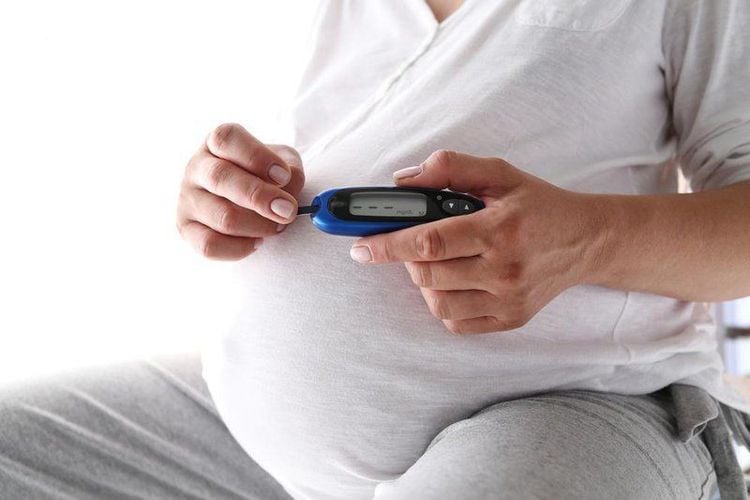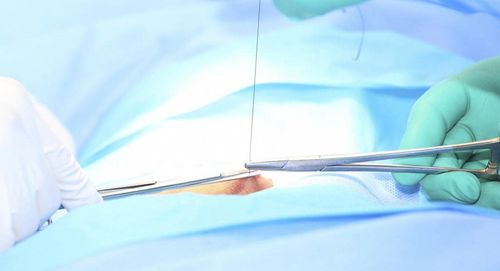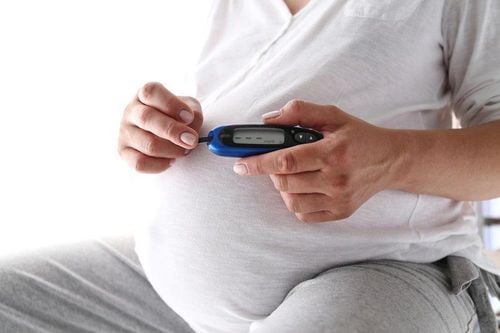This is an automatically translated article.
Dizziness is a very common symptom during pregnancy. Dizziness can make you feel like the room is spinning. Dizziness accompanied by nausea makes the pregnancy days become extremely heavy. Understanding the possible reasons for dizziness during pregnancy will help you better manage this symptom.
1. Causes of dizziness in the first 3 months of pregnancy
1.1. Hormonal changes and lower blood pressure As soon as you begin pregnancy, the hormone levels in the mother's body change to help increase blood flow in the body. This is to help the baby develop in the uterus.
At this time, blood flow increases, shifting to the fetal side, placenta and umbilical cord can cause your blood pressure to change. Accordingly, your blood pressure will drop during pregnancy, also known as hypotension or low blood pressure. This condition can make you feel dizzy, lightheaded, or lightheaded, especially when moving from lying down to sitting or sitting to standing.
Your doctor will check your blood pressure at antenatal appointments. In general, low blood pressure is not a cause for concern or has an adverse effect on pregnancy. Blood pressure tends to gradually return to normal after pregnancy.

1.2. Morning sickness Dizziness can be a result if you have severe nausea and vomiting during early pregnancy. This usually happens very early, is considered one of the signs of pregnancy due to the change in hormone levels in your body. Also, if you vomit a lot and cannot eat or drink anything, Dehydration and electrolytes can make dizziness worse. However, most women will be in remission by the second trimester.
1.3. Ectopic pregnancy Dizziness can be a sign of an ectopic pregnancy. This is a condition when a fertilized egg implants in another location instead of the uterus. In most cases, the site of an ectopic pregnancy usually implanting is the fallopian tube. If this does happen, you may experience dizziness with abdominal pain and vaginal bleeding. Dizziness will be more severe if the ectopic pregnancy is broken, the mother loses a lot of blood. This is a gynecological emergency and requires urgent surgical intervention.
Trắc nghiệm: Bạn có hiểu đúng về dấu hiệu mang thai sớm?
Các dấu hiệu mang thai sớm không phải chỉ mỗi trễ kinh mà còn có rất nhiều dấu hiệu khác như xuất huyết âm đạo, ngực căng tức,… Điểm xem bạn biết được bao nhiêu dấu hiệu mang thai sớm thông qua bài trắc nghiệm này nhé!
2. Causes of dizziness during the second trimester of pregnancy
The reasons why you get dizzy in the first trimester can still extend into the second trimester, like low blood pressure. In addition, the causes of dizziness can also begin to arise when the fetus is gradually progressing.
2.1. Uterine pressure You may experience dizziness if pressure from the uterus containing the developing fetus presses on the blood vessels. It starts in the second or third trimester and becomes more common as the baby gets older.
At this point, even lying on your back can make you dizzy. The inferior vena cava that carries blood back to the heart is compressed. Cardiac output will decrease, blood flow to the brain is limited, and you may experience dizziness or even lightheadedness if you try to sit up or walk.
2.2. Gestational diabetes Sometimes dizziness is a sign of gestational diabetes when your blood sugar gets too high, causing cells that live in a hypertonic environment, severely dehydrated.
To screen for diabetes, your doctor will ask you to test your fasting blood sugar during your prenatal visit between 24 and 28 weeks of pregnancy. If you're diagnosed with this condition, you'll need to monitor your blood sugar regularly and stick to a more rigorous exercise and diet plan.
2.3. Hypoglycemia In contrast to the gestational diabetes described above, hypoglycemia caused by low blood sugar also causes dizziness along with other symptoms such as sweating, tremors, and headaches.
Due to the fast growing fetus, the need for energy is very large. For a boost, add snacks during the day like a piece of fruit, a glass of milk, a piece of cake or cereal.... interspersed with your main meals.

3. Causes of dizziness in the second trimester of pregnancy
Compared with the causes of dizziness in the first and second trimesters, the characteristics of dizziness in the third trimester may remain similar. However, during this period, any abnormal manifestations should not be subjective. You should see your doctor more often to monitor for potentially dangerous conditions that can cause dizziness.
The most important thing is that you need to be careful when walking and standing, to avoid falling, absolutely do not wear high heels. When standing or sitting up, it is necessary to slowly and seek support to avoid dizziness, lightheadedness, lightheadedness, easy falling.
Details of fetal development week by week, every parent should learn:
4. Causes of dizziness during pregnancy
There are several possible causes of full-time dizziness during pregnancy that are not tied to a particular trimester.
4.1. Anemia Due to the increased need for blood to nourish the fetus, the mother can have a decrease in the quantity and quality of red blood cells, causing anemia in the pregnant woman. This is more likely to happen when your diet is not nutritionally complete, there is not enough iron and folic acid in the body.
In addition to feeling dizzy, anemia also makes women feel constantly tired, pale, short of breath, heart palpitations. If anemia is too severe, the development of the fetus will be affected.
4.2. Lack of water Water needs are great throughout pregnancy, especially in the first trimester if you have a lot of morning sickness, nausea or vomiting continuously. This causes you to experience dehydration and electrolyte disturbances.
In the later trimesters, due to the large size of the fetus, it is easy to press on the inferior vena cava, the circulating volume is easily affected further if you do not drink enough water. Not enough blood supply to the organs, especially the brain, will make you dizzy.

5. How to reduce dizziness during pregnancy?
Limit standing posture for a long time continuously. Sit as much as possible; Do not sit or lie in one place for too long. Need to exercise, walk gently to increase blood circulation; When sitting up or standing up slowly, slowly. Avoid sitting, standing up suddenly; Avoid lying on your back during the second and third trimesters; Eat a high-energy diet to prevent blood sugar from falling too low. At the same time also limit fat, carbohydrates, sweet foods too much to prevent diabetes in pregnancy; Drink plenty of water to avoid dehydration, especially when vomiting; Wear comfortable, breathable clothing. Avoid tight clothing, o excessive pressure. If dizziness occurs continuously for many days during pregnancy and does not tend to improve, do not self-medicate without a doctor's prescription. Also, if the dizziness comes on suddenly or is severe from the very beginning, or if the dizziness is accompanied by other symptoms such as vaginal bleeding, abdominal pain, chest pain, headache, blurred vision, heart palpitations, difficulty breathing, fainting... the pregnant woman should be taken to the hospital as soon as possible for timely intervention. The first 3 months are the most sensitive time during pregnancy. In order for mother and baby to be healthy, reduce symptoms of morning sickness and dizziness, parents should note:
Understand early signs of pregnancy, pregnancy poisoning, bleeding during pregnancy. Timely, correct and sufficient first prenatal check-up, avoiding too early/too late. Fetal malformation screening at 12 weeks detects dangerous fetal malformations that can be intervened early. Distinguish between normal vaginal bleeding and pathological vaginal bleeding for timely intervention to maintain pregnancy. Screening for thyroid disease in the first 3 months of pregnancy avoids dangerous risks before and during delivery. Vinmec currently has many maternity packages (12-27-36 weeks), in which the 12-week maternity package helps monitor the health of mother and baby right from the beginning of pregnancy, early detection and timely intervention of health issues. In addition to the usual services, the maternity monitoring program from 12 weeks has special services that other maternity packages do not have such as: Double Test or Triple Test to screen for fetal malformations; Quantitative angiogenesis factor test to diagnose preeclampsia; thyroid screening test; Rubella test; Testing for parasites transmitted from mother to child seriously affects the baby's brain and physical development after birth.
Please dial HOTLINE for more information or register for an appointment HERE. Download MyVinmec app to make appointments faster and to manage your bookings easily.
Reference source: babycentre.co.uk; healthline.com












